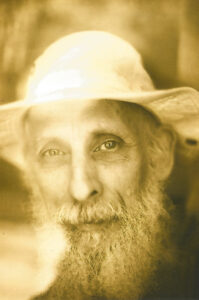“Pray without ceasing,” advised Paul (1 Thess 5:17). But how do we do that? What do we do? If we’re called to unceasing prayer and are serious about accepting this call, the Lord Himself will show us how, and we’ll do it! And not only that, we’ll be brought into community with others who are making the same effort, so that if we fall away from it, or grow discouraged, we’ll have friends to help us get back on track, and restore the peace it brings us!
Many wise remarks have been made over the centuries about this piece of advice. I’m going to share some of my favorites. First is a book called The Way of a Pilgrim1 , an anonymous account of the mid-nineteenth-century wanderings of a Russian mendicant who practiced what is commonly known as the Jesus Prayer. It begins as a holy man tells the wanderer, “we must pray more often to God to teach us to pray without ceasing…. It is prayer itself which will reveal to you how it can be achieved unceasingly.” Good advice, but not enough for the seeker, who has read “I sleep, but my heart waketh” (Song 5:2) and wants to be at prayer even during sleep. Finally, taught constant repetition of the mantra “Lord Jesus Christ, have mercy on me,” he makes that his unwavering practice.
But I myself have not been called to practice this Jesus Prayer, so I pass on to another anonymous work, the fourteenth-century Cloud of Unknowing. This is again a book of advice for seekers of knowledge of God, which is not to be had through the activity of the intellect, but only through love, in spite of the darkness and the “cloud” that hide God from us so long as we inhabit flesh. If we’re called to this contemplative work, we sit quietly and discard all that arises in the consciousness that is not God. We become “Marys.” As in the Mary-and-Martha story of Luke 10:38-42, the “Marthas” of this world will never understand how we benefit the suffering world around us by sitting still! Yet we do.
But I myself have not been enabled to practice any more of this regular “inward retirement” (as we Quakers call it) than busy family life in the world permits. How may I “pray without ceasing” in a world where telephones ring and chores call? The Anglican writer William Law (1686-1761) wrote that we’re always at prayer, so long as we live, either to our Creator or to some part of the creation: therefore the challenge is to learn to pray only to the Creator.
If we’ve ever been in love, we know what praying to some part of the creation feels like: “Notice me! Love me as your only love!” And fear, hunger, poverty, and addiction each has its own way of tempting us to bargain with whatever false god we think might relieve our distress: the god of medicine, weapons, or luck, to save us from death! The god of money, or the economy, to save us from want! The god of alcohol, tobacco, or drugs to quell our anxieties! The apostle Paul wrote of our “bondage” – to sin, to fear, to corruption, to “the god of this world.” We perpetuate this bondage, this slavery, by continuing to pray to wrong things until we lay down self-will and ask God to lead us into living solely by God’s will. Until we’ve made this surrender, it’s meaningless to speak of unceasing prayer.
Early Friends, remembering that “we know not what we should pray for as we ought” (Rom 8:26), rightly understood the ceaseless prayer as something that the Holy Spirit has to do for us, and in us, else it’s merely that vain activity called “will worship” (Col 2:23). But happily, the Holy Spirit seems to delight in keeping us at inward prayer. Isaac Penington writes, “If a man speak ever so much from his own spirit, with ever so much earnestness and affection, yet it is no prayer… but only so far as the Spirit moves to it, and… leads and guides in it.”2 George Fox writes, “they that pray as the Spirit doth move them, know what they ought to pray for. So ‘every man that cometh into the world,’ being in the ‘light that lighteth every man,’ it will direct him to pray, and to pray aright.”3 Robert Barclay writes, “As then inward prayer is necessary at all times, so, so long as the day of every man’s visitation lasteth, he never wants some influence, less or more, for the practice of it. Because he no sooner retires his mind and considers himself in God’s presence but he finds himself in the practice of it.”4 And once God has revealed God’s ever-presence with us and in us, can we ever forget it?
Finally, I’d like to share what Scottish evangelist Oswald Chambers (1874-1917) said about unceasing prayer: “If we think of prayer as the breath in our lungs and the blood from our hearts, we think rightly [about it]. The blood flows ceaselessly, and breathing continues ceaselessly; we are not conscious of it, but it is always going on. We are not always conscious of Jesus keeping us in perfect joint with God, but if we are obeying Him, He always is. Prayer is not an exercise, it is the life.”5 Prayer being an “always and forever” kind of activity, it inevitably changes our habits of interacting with the world around us. We increasingly see Christ present in “even the least of these” (Matt 25:40, 45). It will grow on us that Christ, who according to the Fourth Gospel is the Word of God, outside of Whom nothing came into being (John 1:3, 10), indwells every creature (including the sinners He inwardly rebukes and pleads with), making all creation holy. An inward hush comes over our hearts as a sense of the goodness and beauty of all things grows in us. Cursing, jesting and small talk, quarreling, and all ego-driven forms of self-display begin to seem unworthy of our high calling. Loving our enemies ceases to seem an unnatural thing to do or a duty that we grudgingly carry out because our Savior commanded it, but a natural part of Christ’s great work of the reconciliation of all things (2 Cor 5:18-20, Col 1:20). In this great reconciliation, we now participate cheerfully, because we are starting to experience our membership in His divine body (1 Cor 12:27; Eph 5:30), which either contains our enemies already or shortly will contain them, for God wills the salvation of all (1 Tim 2:4).
To sum it up in one phrase, “church” now becomes everywhere, and everywhere becomes “church.” If “church” is where we go to love other members of Christ, and exchange blessings with them, then church now includes the sidewalk, the airport, the shopping mall, and the emergency room. The others there ordinarily need not know that we are praying for them, but if the Holy Spirit opens our mouth to give ministry to a brother or sister, or our ears to hear ministry from them, let us be ready to welcome the opportunity.
1 Originally published in Kazan, 1884, as Otkrovennye rasskazy strannika dukhovnomu svoyemu ottsu (Candid Narratives of a Pilgrim to His Spiritual Father); best known in English in the translation by Reginald Michael French, originally published 1931, reprinted as The way of a pilgrim; and, The pilgrim continues his way (San Francisco: HarperSanFrancisco, 1954).
2 Penington, “The Way of Life and Death Made Manifest,” Works (Farmington, ME: Quaker Heritage Press, 1995), v. 1, 35.
3 Fox, “The Great Mystery of the Great Whore Unfolded,” Works, v. 3:207.
4 Barclay, Apology for the True Christian Divinity (Farmington, ME: Quaker Heritage Press, 2002; orig. pub. 1678), 330.
5 Chambers, My Utmost for His Highest (Westwood, NJ: Barbour and Co., 1963; orig. published 1935), entry for May 26.

John Jeremiah Edminster (M. Div., Earlham School of Religion, 2019) worships regularly with Conservative Friends and hosts the Tuesday evening House of Light Friends’ Worship Group in his home in Richmond, Indiana. He carries a concern to promote surrender of self to Christ.

What does it mean to be a gathering space for thoughtful and creative reflections on the history, theology, and modern practices of the Church of the Brethren and related movements? Brethren Life & Thought has a long history of working to be such a space. We’re excited to bring our content online through DEVOTION: A Blog by Brethren Life & Thought. Here, you’ll find sermons and other writings from Brethren, Mennonite, and Quaker writers from a variety of theological and social contexts. Some weeks, you might read a piece that resonates with you. Some weeks, you might read a piece that challenges you. Some weeks, you might read a piece you think is heretical. For good or for ill, the Anabaptist and Peace Church movements are remarkably diverse in faith and practice. This blog attempts to expose our readers to the vastness of that diversity – even when it makes us uncomfortable. As you comment, which we highly encourage you to do back on our Facebook page, please remember to do so in light of our membership in the Body of Christ. Let us be different than the world for Jesus truly does invite us to another way of living.

